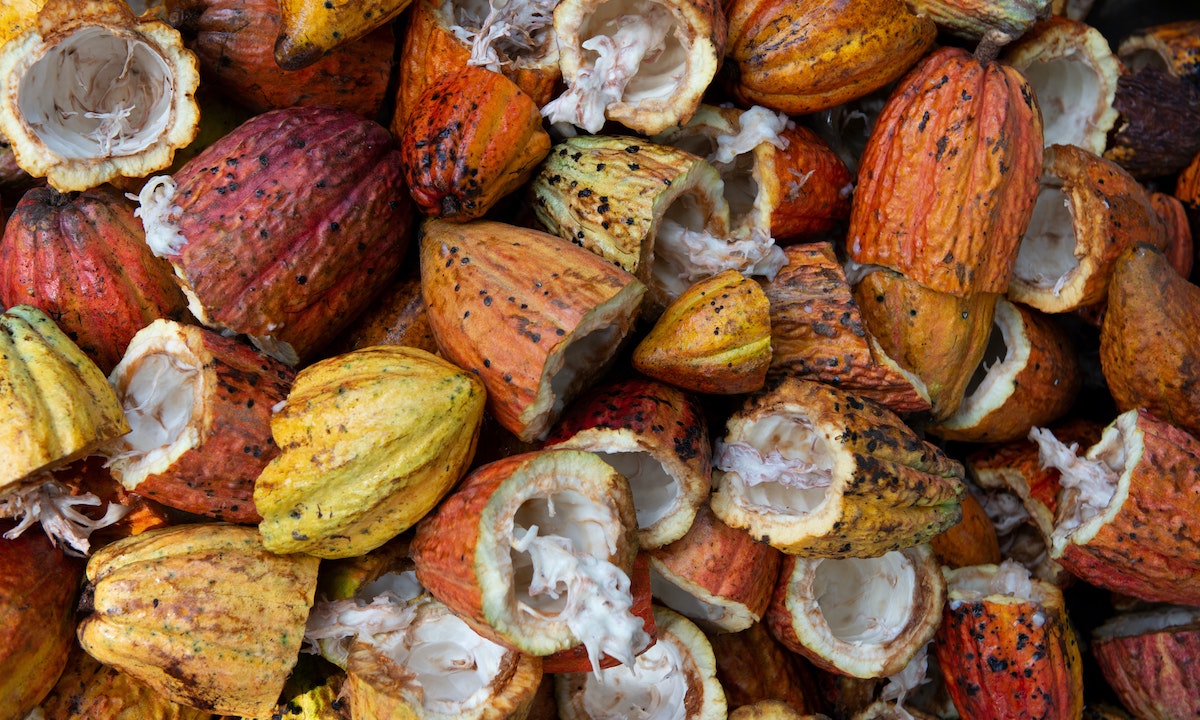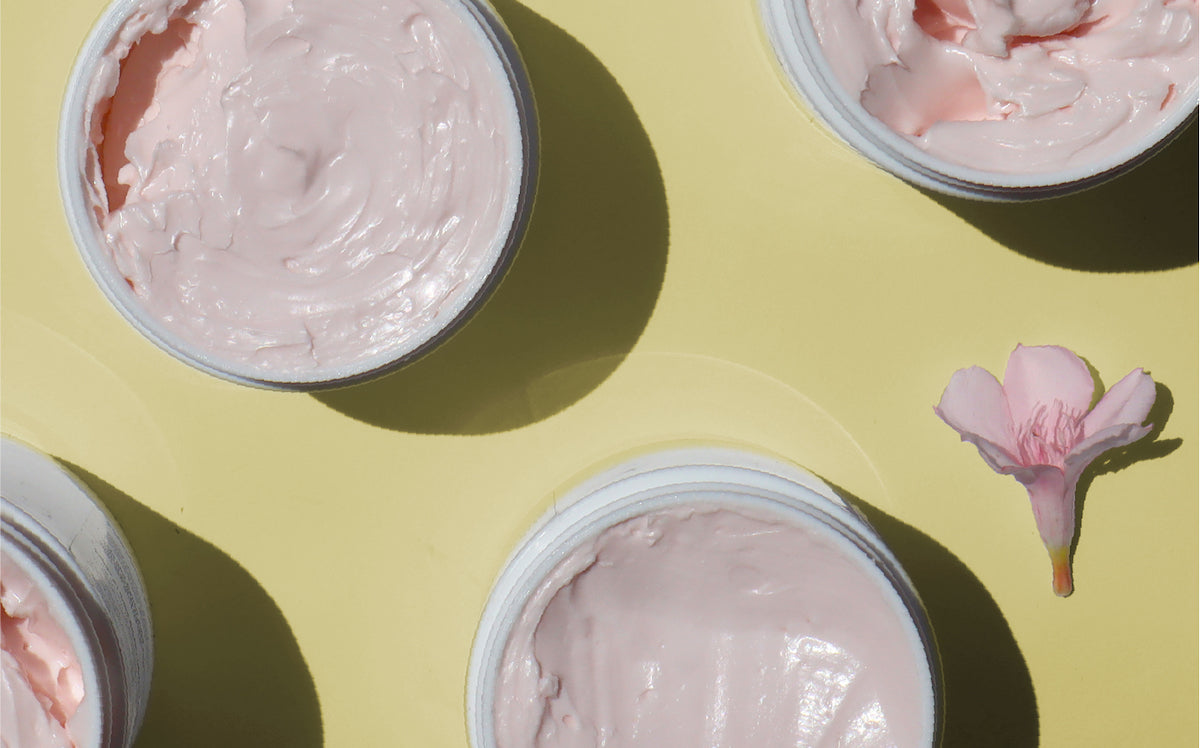Your Cart is Empty
FREE SHIPPING on US orders over $45. Save 25% With Code TAKE25 at checkout.
FREE SHIPPING on US orders over $45. Save 25% With Code TAKE25 at checkout.

You are likely familiar with cosmetic butters, as they appear in thousands of skincare products, but you may be wondering, what are the very best butters for skin? How can we reap all of the benefits of natural butters, and why are they better than other common emollient ingredients?
Cosmetic butters are created from natural sources, including beans, nuts, and seeds. While those ingredients might sound more like food than skincare, these natural products have numerous benefits for skin! In addition to their moisturizing benefits, they can also have anti-inflammatory and antioxidant properties, and often contain vitamins, minerals, and essential fatty acids.

Since they don’t contain water, natural butters have a thick, nourishing consistency and can help lock in skin’s moisture—protecting the all-important acid mantle and moisture barrier. Essential fatty acids in particular have the ability to protect against moisture loss and prevent signs of aging, and since butters are naturally derived, skin sensitivities are extremely rare.
There are several butters that are often used in skincare:
Shea butter is extracted from the shea tree nuts, and is ubiquitous in many types of skincare—for good reason! It has very powerful anti-inflammatory and antioxidant properties, which makes it a fantastic anti-aging ingredient, and a great treatment option for those with dry skin or eczema.
 |
Shop skincare with Shea Butter |
Cocoa butter is a healing powerhouse; the combination of strong antioxidants (including polyphenols) and saturated fats ensure that the skin is both detoxified and fully hydrated. Cocoa butter has a distinctive, natural scent very similar to that of chocolate, and helps “lock-in” moisture for long-term hydration.
 |
Shop skincare with Cocoa Butter |
Mango butter is actually pressed from the seed (“pit”) within the mango fruit, which contains high levels of essential fatty acids, vitamins (particularly vitamin A and vitamin C), and antioxidants. Mango butter has an almost undetectable scent. It’s also non-comedogenic, making it a good choice for congested and acne-prone skin.
 |
Shop skincare with Mango Butter |
Mowrah butter comes from the Madhuca longifolia tree, which originated in India. The butter that is made from the fruit and kernels contains linoleic, stearic, oleic, palmitic acids which are known to prevent premature aging. Mowrah butter is also able to sink deeply into the skin with ease. Like other cosmetic butters, its antioxidant and emollient properties make it a fantastic moisturizer.
 |
Shop skincare with Mowrah Butter |
Kokum butter is one of the “harder” butters, though it melts easily in contact with skin. Like most of the cosmetic butters, its essential fatty acids, antioxidants, and anti-inflammatory properties allow it to provide moisture to skin without causing sensitivity.
Babassu butter is cold-pressed from the babassu palm tree in Brazil, and has a high lauric acid content (a fatty acid that’s known as a more “healthy” saturated fat). Babassu butter feels velvety on the skin, and doesn’t leave a greasy residue.

Many commercial moisturizers are full of fillers like water, fatty alcohols, and mineral oil, which increase the volume of the product without discernible long-term benefits for the skin.
While your skin may feel hydrated in the short term, those ingredients will either evaporate away (like alcohol) or remain sitting on the skin without penetration (like mineral oil) unlike butters, which remain as a protective barrier but also sink deeply into the skin and provide vitamins and minerals for maximum efficacy.
To make matters worse, mineral oil can actually clog pores and result in acne breakouts, and its molecular size is too big to effectively absorb into the skin, unlike its natural butter counterparts. There are also concerns that mineral oil may be carcinogenic after long-term use.
Most natural butters (particularly mowrah butter) have small molecular sizes and are able to deeply penetrate the skin, allowing all of the antioxidants, vitamins, and anti-inflammatory compounds to do their work!

Antioxidants are ingredients that literally prevent oxidation within the skin, a process through which dangerous molecules called free radicals attempt to destabilize important cells.
If skin cells, or DNA cells, are destabilized, it can result in structural problems within the skin, including a breakdown in collagen and elastin. These two powerhouses support the firmness and smoothness of the face, crucuial for a youthful appearance. Antioxidants are able to stabilize free radicals, preventing the damage that they would cause on their own.
It should also be noted that it’s important to avoid free radical exposure, and exposure to ultraviolet radiation in particular. Sunscreen is one of the best ways to keep skin young, as it prevents the damaging effects of oxidation from occurring!
One of the largest “families” of antioxidants is referred to as polyphenols. They are naturally found in some foods (like green tea and berries) and can help prevent certain diseases. They can also prevent premature aging when applied topically to the skin, due to their free-radical fighting capabilities. Polyphenols also prevent collagen loss and promote cell turnover, making them a valuable asset to anti-aging products.
The skin naturally produces sebum, an oily substance that provides moisture and conditioning properties to the skin - as well as protecting it from environmental factors.
When there is an excess of sebum production, skin can become congested and clogged, resulting in bacterial overgrowth and acne. If there is too little sebum, the skin isn’t sufficiently moisturized—and the delicate pH balance that protects skin from bad bacteria is disrupted.
Skincare habits can have a direct effect on skin’s sebum production. If skin is constantly dehydrated through the use of “stripping” products or cleansers (particularly those that are intended to remove all oil from the skin!), the skin will produce excess oil in response.
Natural butters act as emollients, and when applied to the skin on a consistent basis, they can help balance the skin’s oil production. When the skin has the moisturizing properties it needs, it will generally stop over-producing too much oil.
For this reason, natural butters and products that contain them can be excellent alternatives to more harsh cleansers, and can help protect the skin’s moisture barrier without causing congestion.

Omega-3 and Omega-6 fatty acids are essential to skin’s overall health. A study from almost a century ago showed that a diet deprived of essential fatty acids resulted in skin damage and abnormalities as well as loss of moisture. Omega-6s in particular have a vital role in the structure of the skin, and thus in preventing premature aging.
There’s strong evidence to suggest that they prevent collagen breakdown, protect from UV damage, and increase skin’s metabolism. The body does not synthesize essential fatty acids on its own, which means that they have to be derived from diet or topical application.
Sunburns are caused by overexposure to UV radiation, which results in cellular damage, inflammation, and a weakened immune system. Essential fatty acids, applied topically to the skin, can help prevent and reverse some of the damage caused by UV overexposure. Because of their essential role in wound healing, essential fatty acids can also prevent and repair the damaging aging effects of the sun.
Cosmetic butters have a long list of benefits:

Also, because they are so gentle on the skin, they are perfect for people with skincare sensitivities, though it’s always a good idea to spot test before using any new product. A good spot for testing is on the skin on the underside of your forearm - on the ‘inside’ of your elbow.
When you seek out the best natural butters to add to your skincare routine, you’ll be delighted by the natural anti-aging and protective benefits you will experience!